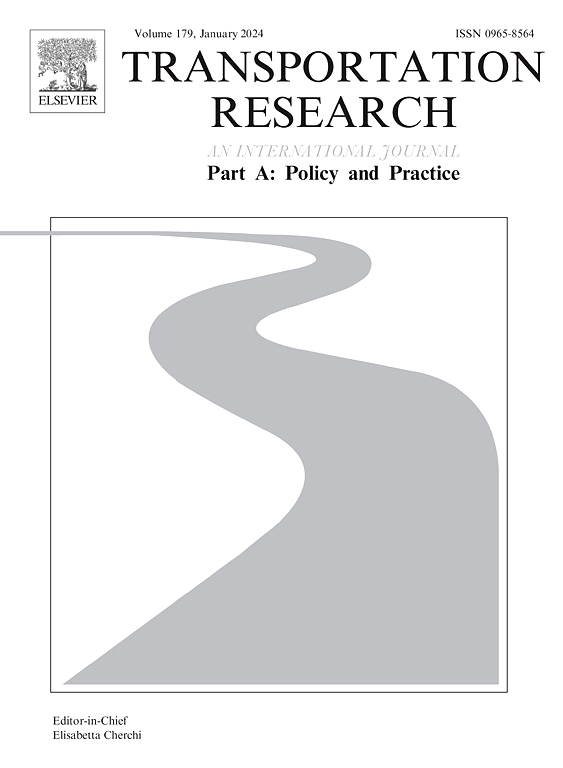Exponential effects of public purchasing subsidies: a full-sample analysis of electric vehicle adoption in Germany
IF 6.8
1区 工程技术
Q1 ECONOMICS
Transportation Research Part A-Policy and Practice
Pub Date : 2025-09-18
DOI:10.1016/j.tra.2025.104668
引用次数: 0
Abstract
This is a first study to employ a national full sample dataset for a socioeconomic analysis of the adoption of electric vehicles (EVs). We use the most recent vehicle registration dataset from the Federal Motor Transport Authority of Germany, which includes the complete underlying population of German vehicle owners. Combining web-scraped data covering all vehicles available in the German market with actual registration data allows a unique analysis of the individual decisions to purchase an EV. While most studies on EV adoption rely on surveys assessing a few hundred to several thousand respondents, our novel approach introduces a method to transform the official German vehicle registration database into a choice experiment format comprising five million observations representing ex-post revealed vehicle choice preferences. We confirm results of earlier studies finding that financial incentives are a most relevant factor for EV adoption, but innovate by finding exponential effects. An average subsidy of approximately €7700 resulted in EVs accounting for 12% of newly registered private vehicles. We estimate that this share would be 1.2% in the absence of subsidies. However, adoption rates would have increased exponentially to 20% if a uniform maximum subsidy of €9000 had been implemented over the entire observation period from 2011 to 2023.
政府采购补贴的指数效应:德国电动汽车采用的全样本分析
这是第一个采用国家完整样本数据集对电动汽车(ev)采用进行社会经济分析的研究。我们使用来自德国联邦汽车运输管理局的最新车辆登记数据集,其中包括德国车主的完整潜在人口。将德国市场上所有可用车辆的网络抓取数据与实际注册数据相结合,可以对购买电动汽车的个人决定进行独特的分析。虽然大多数关于电动汽车采用的研究依赖于评估几百到几千名受访者的调查,但我们的新方法引入了一种方法,将德国官方车辆登记数据库转换为选择实验格式,其中包括500万份代表后显示车辆选择偏好的观察结果。我们确认了早期研究的结果,即经济激励是电动汽车采用的最相关因素,但通过发现指数效应进行创新。平均约7700欧元的补贴导致电动汽车占新注册私家车的12%。我们估计,在没有补贴的情况下,这一比例将为1.2%。然而,如果在2011年至2023年的整个观察期内实施9000欧元的统一最高补贴,采用率将呈指数增长至20%。
本文章由计算机程序翻译,如有差异,请以英文原文为准。
求助全文
约1分钟内获得全文
求助全文
来源期刊
CiteScore
13.20
自引率
7.80%
发文量
257
审稿时长
9.8 months
期刊介绍:
Transportation Research: Part A contains papers of general interest in all passenger and freight transportation modes: policy analysis, formulation and evaluation; planning; interaction with the political, socioeconomic and physical environment; design, management and evaluation of transportation systems. Topics are approached from any discipline or perspective: economics, engineering, sociology, psychology, etc. Case studies, survey and expository papers are included, as are articles which contribute to unification of the field, or to an understanding of the comparative aspects of different systems. Papers which assess the scope for technological innovation within a social or political framework are also published. The journal is international, and places equal emphasis on the problems of industrialized and non-industrialized regions.
Part A''s aims and scope are complementary to Transportation Research Part B: Methodological, Part C: Emerging Technologies and Part D: Transport and Environment. Part E: Logistics and Transportation Review. Part F: Traffic Psychology and Behaviour. The complete set forms the most cohesive and comprehensive reference of current research in transportation science.

 求助内容:
求助内容: 应助结果提醒方式:
应助结果提醒方式:


